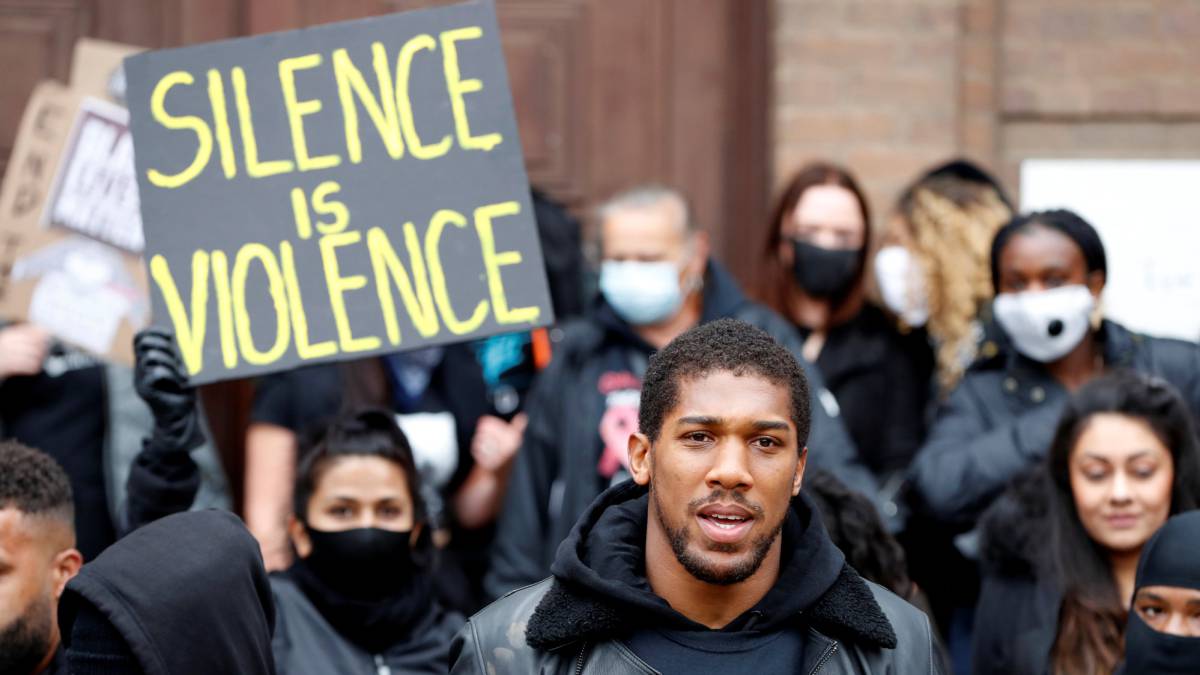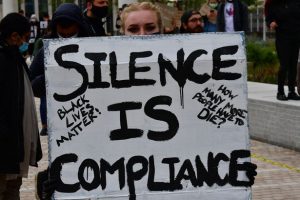
Image Source: https://www.thesun.co.uk/sport/11806575/anthony-joshua-tackling-racism-in-local-community/
A lot has been made in recent weeks of the ‘Black Lives Matter’ campaign to root out racism, and remove symbols that embrace Britain’s involvement in the African Slave Trade. Yet for all the uproar, little has been made of the injustice faced in Britain’s ex- colonies, much of which are a direct or indirect result of Britain’s past rule. For instance, the routine slaughter of Nigeria’s Christians and innocent citizens, whom are also black people with valuable lives in the insecurity-ravaged middle-belt and northern regions of the country.
Not only are we beginning to see the true depth of institutional racism in various sectors of British life but our very colourful past especially in relation to our historical roles in Slave trade and colonialism puts a moral obligation on the UK government to, in the very least show itself to be even handed and better still, seek to atone for its past misdeeds.
Leaving aside the obvious wrongs from a few centuries ago of the slave traders or the messaging and injustice of the British government compensating only the slave owners but not the black victims, we have the relatively more recent actions in ex-colonial countries like Nigeria where we constructed a time-bomb by amalgamating hundreds of diverse ethnic communities, imposing indirect rule and subtlety pitting the north against the south. Well, today that timed bomb has begun exploding in slow-motion.
The International Committee on Nigeria (ICON) recently reported that Boko Haram, whose capture of vulnerable teenage girls such as Leah Sharibu made headlines in 2018, has killed 43,242 Nigerians since 2010. In addition, Fulani Militants slaughtered 17,284 Nigerians since 2010, bringing the combined total to 60,526. The true number is feared to be far higher owing to mass burnings, chaotic attack aftermaths, disappearances and population displacement.
ICON shows there have been at least 7558 terrorist-related incidents in the last decade, with the insurgency far worse in Nigeria than in the surrounding West African countries.
Approximately 75% of the civilians silently slaughtered are Christians. Muslims who refuse to go along with the growing Islamist extremist ideology are also slaughtered.
UN investigators suggest over 10,000 Rohingya Muslims were tragically murdered during the Myanmar crisis in recent years. Disturbingly, Nigeria’s unfolding genocide has now surpassed the scale of Myanmar highlighting the clear disparity with how the UK government and International community is responding to the almost daily slaughtering of black lives in Nigeria. Have we become desensitised to Black suffering?
In many ways the current Nigerian situation mirrors the notorious crisis facing Myanmar’s Rohingya Muslims. Much like them, denied state protection or citizenship from both Burma and Bangladesh, northern Nigeria’s Christians are confronted with roaming Islamist hordes in the Chad border region and terrorists from the Sahel looking to expand their caliphate into Nigerian territory (twelve out of the nineteen northern states are currently under Sharia law), and a very docile or deliberately blind administration in the capital Abuja which is failing in its primary duty to protect its citizens and vulnerable communities.
Much like the suffering Rohingya Muslims, most of the Christians attacked in their churches, homes and farms are native to their region and have tilled the soil for generations. Hundreds of thousands have ended up in internal displacement camps (IDPs), with only minimal UN protection in the midst of violent Islamist activity on one side, and a hapless national Nigerian security force on the other, who have proven to be either unwilling or incapable of defending them. There are even reports of Christians being given smaller food rations in some of these ‘safe’ camps. Nigeria’s Christians in regions such as Kaduna and the Middle Belt are de facto stateless.
Just as the Rohingya Muslims suffered brutalities at the hands of the Myanmar army, the standoff aloofness of the Nigerian army itself should be seen as a contributing factor to the insecurity of the troubled Nigerian regions. Institutional ethnic and religious favouritism and corruption is paralleled in both countries, with the Corruption Perceptions Index 2019 placing Nigeria 146th in the world scoring an abysmal 26 points out of a possible 100, level with Iran. The current Nigerian security establishment has an eighty-twenty Muslim to Christian ratio, despite a nominal aim for parity in the country’s institutions.
The UK and international response to the situation in Nigeria’s north and middle belt has been negligible. The scale of the violence merits our quick and sincere action. We must wake up to the Nigerian crisis with serious consideration of the geopolitical impact of instability in the region. The UK response to the Rohingya provides a great model but to date it’s hard to think of anything comparative or significantly meaningful the UK has done in response to the crisis in the most populous Black nation in the world.
As the UK takes its role in this post-brexit era as a global Leader on the world stage, it is vital that the new Foreign, Commonwealth and Development Office (as the Foreign Commonwealth Office will become from September: FCDO) leads the way in providing equal or more amounts of funding to help persecuted Christians in Nigeria’s north as we did for the Rohingya muslims in Myanmar where we invested over £200m to directly address the injustice. Even though Nigeria has annually received over £300 million of British taxpayer money in the form of foreign aid, this has been dispensed and dispersed on a motely of projects and not enough has been focussed on dealing specifically with Nigeria’s insecurity crisis.
As the UK buffs up our Human Rights credentials, we must extend the very welcome Maginsky sanction lists to perpetrators of Freedom of Religious Beliefs (FoRB) violations and we must also consider suspending military co-operation as we did in Myanmar. The British involvement could be tainted as being lame and ineffective in this decade-long fight with the insurgents whom the Nigerian government have declared as defeated but yet seem to be waxing stronger, only recently shooting down a UN helicopter in Nigeria. The UK must use its influence on the UN security council to push for resolutions to save lives of innocent citizens and Yes, the Prime Minister, Boris Johnson must lead from the front by publicly speaking truth to our global relatives and demand action. His ‘levelling up’ agenda must extend to bringing up all who are in need and in danger – starting with The Commonwealth.
Clearly, years of empty promises to defend the region’s Christians and vulnerable communities by the Nigerian President Muhammadu Buhari, have produced rotten fruit. This ignorance, or worse, is difficult to expose in a country ranked 120 out of 180 for press freedom by Reporters Without Borders who discovered a ‘climate of permanent violence’ in Nigeria – It places just above Afghanistan.
The UK must stop ignoring the silent slaughter of Nigeria’s Christians just as we rightly deplored the massacre and humiliation of the Rohingya Muslims. It is very clear when the UK takes an international foreign affairs situation seriously and the parity is currently missing from how we are handling the Nigerian situation. For the sake of peace and justice in Africa and the world, for the sake of truth and reconciliation of past misdeeds, the UK government must act responsibly now to save lives in Nigeria and in its various ex-colonies by joining the fight for Peace and Social Justice.

Image Source: https://www.birminghammail.co.uk/news/midlands-news/most-poignant-banners-signs-birmingham-18366624
ENDS
Ayo Adedoyin is Chief Executive of International Organisation for Peace and Social Justice (PSJ UK), a UK-based humanitarian organisation of Nigerians in diaspora campaigning against the persecution of Christians and other vulnerable communities in Nigeria.
Leave a Reply